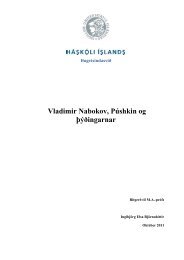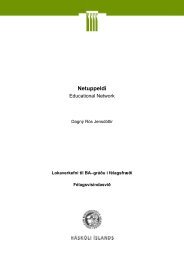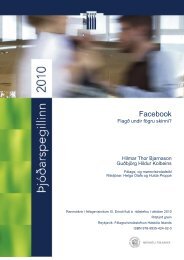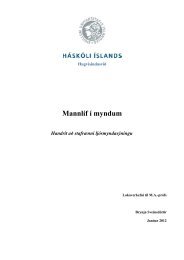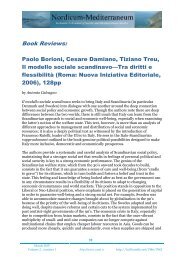Cross-Cultural Communication Do Icelanders have the ... - Skemman
Cross-Cultural Communication Do Icelanders have the ... - Skemman
Cross-Cultural Communication Do Icelanders have the ... - Skemman
Create successful ePaper yourself
Turn your PDF publications into a flip-book with our unique Google optimized e-Paper software.
LOK 2106 University of Akureyri<br />
Lived abroad working or studying: 93%<br />
Length of living abroad<br />
Less than a year: 10%<br />
1-5 years: 44%<br />
6-10 years: 22%<br />
More than 10 years: 7%<br />
Born abroad: 17%<br />
Number of foreign countries lived in:<br />
1 country : 67%<br />
2 countries: 17%<br />
3 countries: 12%<br />
4 countries: 4%<br />
The importance of giving students insight into <strong>the</strong> culture of relevant<br />
language area<br />
Ra<strong>the</strong>r important: 10%<br />
Important: 26%<br />
Very important: 64%<br />
When asked why <strong>the</strong>y thought it important to involve education about <strong>the</strong><br />
target country in <strong>the</strong> language teaching, 30% of <strong>the</strong> teachers stated that<br />
culture and language were interwoven and inseparable. “Language is <strong>the</strong><br />
bridge to culture. Without <strong>the</strong> insight into <strong>the</strong> culture of <strong>the</strong> country you<br />
cannot really understand what is written. We learn <strong>the</strong> language to connect<br />
us to <strong>the</strong> culture because it matters to us. It would be ridiculous to build a<br />
bridge without an attachment on <strong>the</strong> o<strong>the</strong>r side” (21)<br />
15% of <strong>the</strong> teachers regarded discussion about <strong>the</strong> culture, made <strong>the</strong><br />
language study more interesting and diverse and <strong>the</strong>refore easier for <strong>the</strong><br />
students while <strong>the</strong>y become curious and feel <strong>the</strong> study has more purpose.<br />
“The students can appreciate and “feel” <strong>the</strong> language better if <strong>the</strong>y <strong>have</strong><br />
some understanding of <strong>the</strong> culture” (1)<br />
14% of <strong>the</strong> teachers mentioned that involving culture in language teaching<br />
was important to increase <strong>the</strong> interest of <strong>the</strong> students in <strong>the</strong> target country<br />
and prepare <strong>the</strong>m for a visit or stay.<br />
“It influences how <strong>the</strong> students understand some of <strong>the</strong> texts <strong>the</strong>y read; <strong>the</strong>y<br />
need to understand <strong>the</strong> cultural implications of certain kinds of language<br />
26<br />
Steinunn Aðalbjarnardóttir




